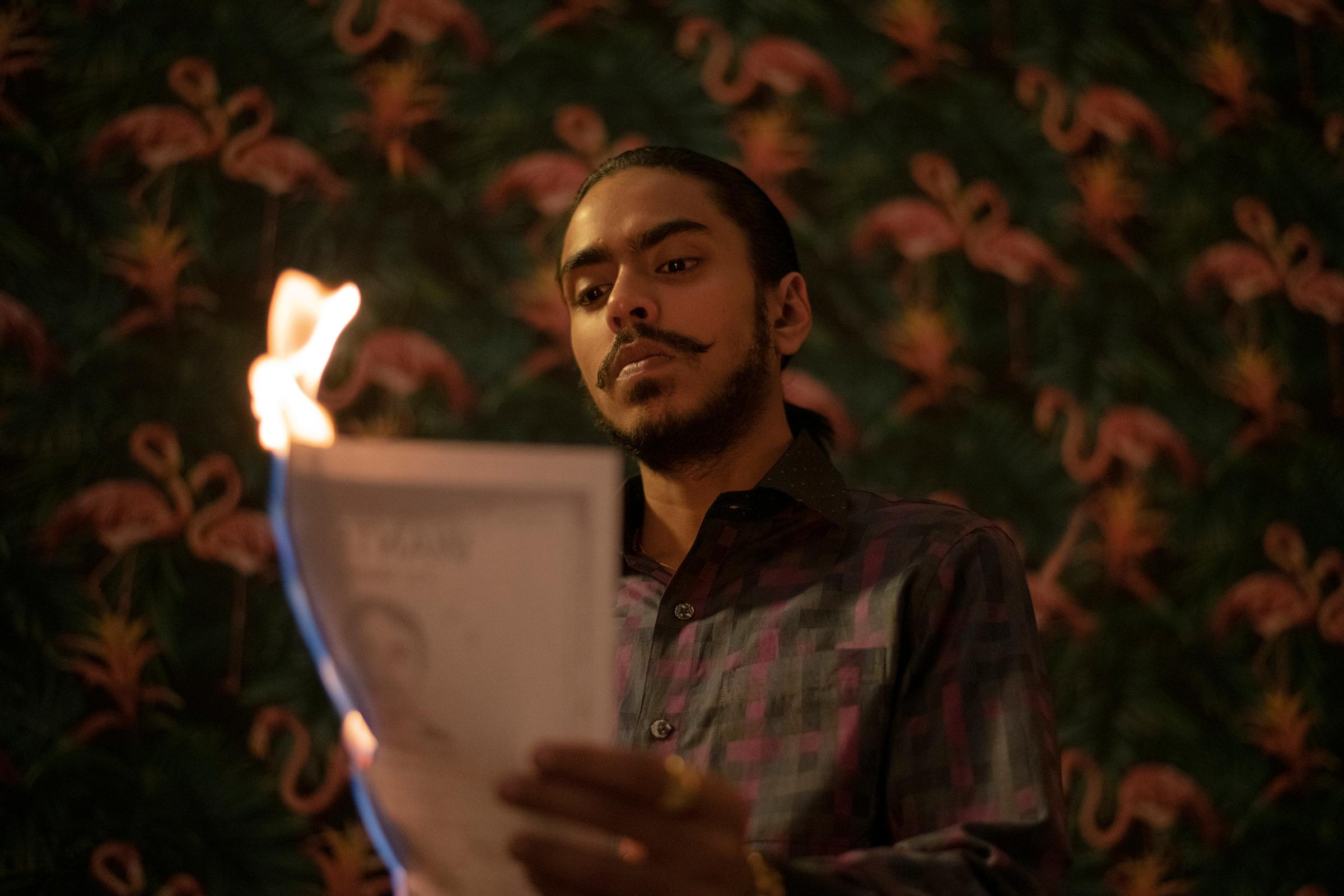Sometimes a great face is all you really need to set a movie spinning, and Ramin Bahrani’s The White Tiger, adapted from Aravind Adiga’s 2008 novel, has one: Adarsh Gourav plays Balram, the antihero of this sometimes bitterly funny, sometimes wrenching crime drama. When we first meet him, he is a slick, self-styled entrepreneur in Bangalore, a city he calls “the Silicon Valley of India.” But this wily, ambitious Balram—with his trendy clothes and neatly waxed mustache—used to be a very different Balram, a kid from a small village who saw his father work himself into an early death, funneling every rupee he made to the boy’s controlling grandmother, a formidable figure he calls granny. (In this story, there’s no room for warm matriarchal stereotypes doling out unconditional love.)
But Balram is exceptionally bright, and he’s good at school—an academic dignitary likens him to the “white tiger,” a special being who comes around just once a generation. And so, as a teenager, Balram decides to become a driver, in the hopes of leaving his village for a better life. He heads for the city and finagles his way into a job with the tyrannical landlord known as the Stork (Mahesh Manjrekar) who used to extort money from his village. Balram eventually becomes the personal driver of the Stork’s son, Ashok (played by the enormously appealing Rajkummar Rao), a progressive-minded young man who has spent time in America and has brought a raised-in-America wife, Pinky (Priyanka Chopra), home with him. Balram becomes their fawning servant not because it’s his choice but because it’s his destiny: this isn’t just the best job he can find; it’s the job he was born to do.

The White Tiger is a bitter indictment of caste-system rigidity embedded within a Scarface-like, rags-to-riches story. You want Balram to succeed even as you recoil at almost every choice he makes along the way: sometimes he’s a victim of others’ cruelty and thoughtlessness. But he also makes calculating and, worse, morally reprehensible choices. This is a complex whirl of a story, and Bahrani—the director of films like Man Push Cart and Goodbye Solo, as well as HBO’s recent Fahrenheit 451—navigates it deftly. Many of the movie’s visual signals are easy to read: you can’t fail to see the contrast between Ashok and Pinky’s large, lavish apartment in Delhi and the cockroach-infested shed Balram calls home—it’s really just a place he goes to sleep, since his work hours essentially have no limits. But the story’s emotional subtleties give it a depth that’s sometimes painful to reckon with. Ashok and Pinky are essentially kind to Balram, but they also condescend to him. This is the push-pull of the master-servant relationship, the key dynamic of the story. Balram is obsequious because he has to be, but he can’t help resenting his bosses’ pedigree and money. He’s also aware that, despite their seemingly modern ways, they see him as inferior. “Do we loathe our masters behind a facade of love,” he asks himself at one point, “or do we love them behind a façade of loathing?” His meager livelihood depends on his capacity for loyalty and subservience, but he can’t help wanting more for himself.
Read more reviews by Stephanie Zacharek
There’s poverty in every country, and in every country there are people yearning to do better for themselves. But The White Tiger—especially Gourav’s performance, marvelous in its intensity and shifting tones—captures that drive in a specific and persuasive way. Balram is a kind of genius, figuring out how to game a complex system, thousands of years old, that’s stacked against him; his opportunism is a survival mechanism. But then—most pronounced in a scene when the Stork tries to use him as a pawn in a heinous scheme—his face betrays a pure and melting guilelessness that can cut right through you. His future depends on learning how not to be a poor country kid. The White Tiger, a fiction set in the recent past, in a real place, is a compelling and extremely well crafted crime drama. But the price Balram pays for his success is a steep one, and the movie’s ending is more unsettling than it is exhilarating. It makes you feel you’ve been left with a problem you can’t solve.
More Must-Reads from TIME
- Cybersecurity Experts Are Sounding the Alarm on DOGE
- Meet the 2025 Women of the Year
- The Harsh Truth About Disability Inclusion
- Why Do More Young Adults Have Cancer?
- Colman Domingo Leads With Radical Love
- How to Get Better at Doing Things Alone
- Michelle Zauner Stares Down the Darkness
Contact us at letters@time.com